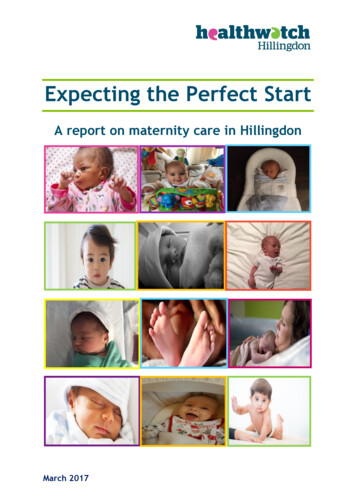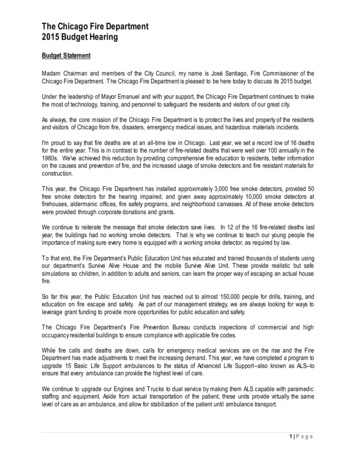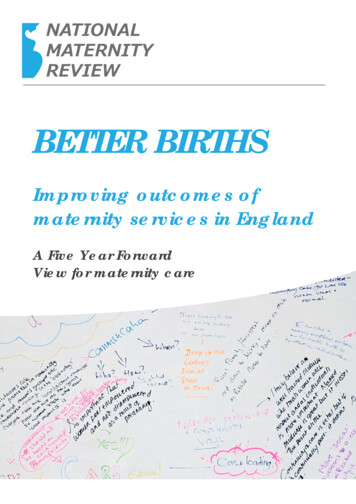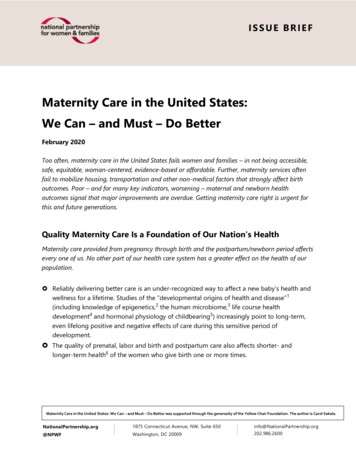
Transcription
Spanish Agencyfor InternationalDevelopmentCooperationTechnical Cooperation OfficeMATERNITY PROTECTION FORFEMALE WORKERS:LAWS AND PRACTICES IN ASEAN
MATERNITY PROTECTION FOR FEMALEWORKERS:LAWS AND PRACTICES IN ASEAN
TABLE OF CONTENTS1.Introduction12.List of Participants33.Tentative Program94.Concept Note of the Regional Workshop on Social Securityand Maternity Protection for Female Workers: Laws andPractices in ASEAN165.Opening Remarks246.ASEAN Maternity benefits357.Brunei Darussalam388.Cambodia469.Indonesia4910. Lao PDR5711. Malaysia6212. The Philippines6613. Singapore7514. Thailand8315. VietNam85
SOCIAL SECURITY AND MATERNITY PROTECTION FOR FEMALE WORKERS: LAWS ANDPRACTICES IN ASEAN1INTRODUCTIONThe ASEAN integration process has come up with various frameworksthat pronounce ASEAN’s commitment towards providing socialsecurity for its citizens. The ASEAN Charter, which was ratified in2008, states that ASEAN shall provide its people with social welfareto enhance their wellbeing and livelihood. Likewise, the ASEAN SocioCultural Community Blueprint (2009) charts social welfare andprotection as one of its priorities. It envisions the improvement of thequality, coverage and sustainability of social protection. Furthermore,the ASEAN Labour Ministers’ Work Programme 2010-2015 and theASEAN Committee on Women Work Plan 2011-2015 reflect ASEAN’sdedication to develop national and regional plans on social securitysystems, including outlining strategies on how to extend social securityto the informal sector and to strengthen social protection for womenat the workplace.Despite the various commitments made by the ASEAN Member Statesin enhancing social security, problems of vulnerable employment,especially among the group of female workers are still prevalent. Themajority of working-age women in Southeast Asia are lower than thatof men and women are usually lower paid. Furthermore, women facehigher barriers to enter the workforce for example after spending timefor giving the birth, caring little child or doing non paid homework.This leads to the difficulty for women to join social security benefits.Not only women in the nation have to face up with difficulties butmigrant worker also have to. Therefore, ASEAN countries need topursue additional strategies to strengthen social protection of (female)migrant workers by promoting agreements between ASEAN countrieswith the aim at ensuring that migrant workers and their families willhave access to the programmes of the countries in which they haveworked and are able to transfer their entitlements.1
2SOCIAL SECURITY AND MATERNITY PROTECTION FOR FEMALE WORKERS: LAWS ANDPRACTICES IN ASEANIn terms of maternity protection at the workplace, there is a particularneed for effective actions through coherent and collaborativeapproaches at both regional and national levels. They shall ensureelementary rights such as maternity leave, cash benefits, medical care,protection from workplace risks, protection from discrimination anddismissals, and the right to breastfeeding on return to work.The Ministry of Labor, Invalids and Social Affairs of Viet Nam wouldlike to introduce this booklet with the aim of introducing goodpractices related to gender - responsive policies and measures toensure equal social security from ASEAN Member States. The Ministryof Labor, Invalids and Social Affairs of Viet Nam would also like to takethis opportunity to express our sincere thank to AECID for financialsupport for this publication.
SOCIAL SECURITY AND MATERNITY PROTECTION FOR FEMALE WORKERS: LAWS ANDPRACTICES IN ASEAN2LIST OF PARTICIPANTSBrunei Darussalam1. Ms NORYANI HAJI ABDUL RANIDepartment of Community DevelopmentMiniStry of Culture, Youth and SportsEmail: ninakarina3a@hotmail.comTel: 6732 380667/8Fax: 6732 386732. Ms NOOR HIDAYAN HAJI OSMANDepartment of Community, DevelopmentMinsitry of Culture, Youth and SportsEmail: hidayahosman22@gmail.comTel: 673 8198494Fax: 673 2260401Indonesia1. Ms Lenny N. RosalinDirectorWomen Labour Protection DepartmentMinistry of Women Empowerment and Child ProtectionEmail: lennyrosalin@gmail.com ; lennynr@bappenas.go.idTel: 62-21-3805559Fax: 62-21-38055422. Ms Nuniek MedyawatiMinistry of Manpower and TransmigationEmail: nuniekmeaya@yahoo.comTel: 62-21-5251910Fax: 62-21-52519103
4SOCIAL SECURITY AND MATERNITY PROTECTION FOR FEMALE WORKERS: LAWS ANDPRACTICES IN ASEAN3. Mrs. Jogaswitani DinartitusMinistry of manpower and transmigrationEmail: linartitus@yahoo.comTel: 62-21-5251910Fax62-21-52519104. Mr Djuni ThamriITPI Popular IndonesiaEmail: juni.thamrin@spp-cct.org ; juni.thamrin@itpipopular.orgTel: 62-812-236-7154FaxLao PDR1. Ms SOUTHILA SENGDARALao Women’s UnionEmail: stl sdr@hotmail.comTel: 856 2121 4306Fax: 856 2121 43062. Ms BOUNPONE MOUNTIVONGHead of Labour Policy and Planning DivisionMinistry of Labour and Social WelfareEmail: bounponemtv@yahoo.comTel: 00856 20 554 02468Fax: 00856 2121 3247Malaysia1. Mr JACK MEREDUKODirector of Labor StandardEmail: jack@mohr.gov.myTel: 03 88865059Fax: 03 888923672. Mrs SAMIHAH MD RAZISocial Security OrganizationEmail: samihar@perkeso.gov.myTel: 603-4252 5984 / 6012-9425599Fax: 603-4257 2479
SOCIAL SECURITY AND MATERNITY PROTECTION FOR FEMALE WORKERS: LAWS ANDPRACTICES IN ASEAN3. Ms FARAH KAREENA HADENANOrganizationMinistry of Women family and Community development MalaysiaEmail: kareena@kpwkm.gov.myTel: 603 8323 1330 / 601 96537273Fax: 603 8323 2019Philippines1. Ms CAASI MA. THERESAPhilippine Commisson on WomenEmail: nobleactivist@yahoo.comTel: 063-0915-7483840 / 063-7354763Fax: 063 735 44 492. Ms MARIA GLORIA TANGODepartment of Labor and EmploymentEmail: glotango1983@yahoo.comTel: 063 0917 7076405Fax:Singapore1. Ms KHIM HWEE CHUAOffice for Women’s DevelopmentEmail: chua khim hwee@msf.gov.sgTel: 63548151Fax: 625115262. Mrs TAN HWEE SEHCorporate management and office for women’s developmentEmail: tan hwee seh@msf.gov.sgTel: 63548168Fax: 625901495
6SOCIAL SECURITY AND MATERNITY PROTECTION FOR FEMALE WORKERS: LAWS ANDPRACTICES IN ASEANThailand1. Ms PHUMESSAWATDI PERADAOffice of Women’s Affairs and Family DevelopmentMinistry of Social Development and Human SecurityEmail: perada.p@hotmail.com / perada.ph@owf.go.thTel: 662 3068766Fax: 662 3089252. Mrs SRICHAT SIRIRATSocial Security OfficeMinistry of LaborEmail: sirirat.si@sso.go.th / tummeng2004@hotmail.comTel: 662 956 2286Fax: 662 525 2455Vietnam1. Le Kim DungDirector GeneralInternational Cooperation DepartmentMinistry of Labor, Invalids and Social Affairs2. Tran Thanh MinhInternational Cooperation DepartmentMinistry of Labor, Invalids and Social Affairs3. Nguyen Ngoc AnhInternational Cooperation DepartmentMinistry of Labor, Invalids and Social Affairs4. Ms. Patricia Rosa GarciaTechnical AssistanceMoLISA – ACID5. Ministry of Labor, Invalids and Social AffairsNguyen Thi Bich VanMoLISA – ACID
SOCIAL SECURITY AND MATERNITY PROTECTION FOR FEMALE WORKERS: LAWS ANDPRACTICES IN ASEAN6. Nguyen Thi Dieu HongGender Equality DepartmentMinistry of Labor, Invalids and Social Affairs7. Nguyen Thi Tuyet MinhVietnam Chamber of Commerce and Industry (VCCI)8. Nguyen Thi Kim DungVietnam Women Union9. Trinh Thanh HangVietnam General Confederation of Labour (VGCL)10. Tran Thu Phuong11. Vietnam General Confederation of Labour (VGCL)Nguyen Thi Tuyet MaiVietnam Women Union12. Luong Thu HaEmployment BureuMinistry of Labor, Invalids and Social Affairs13. Nguyen Ngoc YenLegislation DepartmentMinistry of Labor, Invalids and Social Affairs14. Le Thi Huong ThomSocial Security DepartmentMinistry of Labor, Invalids and Social Affairs15. Do Hanh ChiAction Aid16. Dong Sy Thanh HuongDepartment of Occupational Safety and HealthMinistry of Labor, Invalids and Social Affairs17. Ta Thi Bich LienASETUC Vietnam18. Trinh Thi NguyetSocial Protection DepartmentMinistry of Labor, Invalids and Social Affairs7
8SOCIAL SECURITY AND MATERNITY PROTECTION FOR FEMALE WORKERS: LAWS ANDPRACTICES IN ASEAN19. Trinh Thi Hoang AnhGender EqualityMinistry of Labor, Invalids and Social Affairs20. Nguyen Thi Hoai LinhVietnam Women Union21. Mai Dieu HuyenVietnam Chamber of Commerce and Industry (VCCI)UN Women1. Ms Deepar BharathiProgramme Manager, Regional Programme on EmpoweringWomen Migrant Workers in ASIAUN Women, Regional Office for Asia and the Pacific2. Ms Vu Phuong LyUN Women in VietnamFriedrich-Ebert-Stiftung (FES)1. Ms Jullia MuellerChief RepresentativeFriedrich-Ebert-Stiftung (FES) Office for Regional Cooperation inSingapore2. Mr Erwin SchweisshelmChief RepresentativeFriedrich-Ebert-Stiftung (FES) Office for Regional Cooperation inVietnam3. Mr Michael LangerFriedrich-Ebert-Stiftung (FES) Office for Regional Cooperation inBerlinASEAN SecretariatMs Nur Ismi Hanid
SOCIAL SECURITY AND MATERNITY PROTECTION FOR FEMALE WORKERS: LAWS ANDPRACTICES IN ASEAN3TENTATIVE PROGRAMMESunday, May 5th, 2013All dayArrival of international participants8:15 – 8:45RegistrationMonday, May 6th, 20138:45 – 9:15WELCOME REMARKS AND INTRODUCTION- N.N., MoLISA- N.N., SLOM- N.N., ACW- N.N., ASECSESSION 1- N.N., FESPromoting gender-responsive social security inASEAN9
10SOCIAL SECURITY AND MATERNITY PROTECTION FOR FEMALE WORKERS: LAWS ANDPRACTICES IN ASEANThis session aims at setting the stage for thesubsequent rounds of discussion. It will start withan input on the necessities of integrating genderjustice and the needs of women in the structureand coverage of social security system.The second input will give an overview on theissues of gender inequalities and trends in femaleemployment across the ASEAN region and whatimplications they have for social security schemes.Furthermore, it will provide an overview whichsteps have been taken on the ASEAN level to strivefor gender-sensitive social security scheme thattake women’s needs into account.Chair:ASEAN delegate from Singapore, or Malaysia orPhilippines9:15 – 09:45Minding “gender-blind” social security schemes –Why gender justice mattersSpeaker: Ms. Yamini MishraGRB Specialist, South, East and South East Asia09:45 – 10:1510:15 – 10:4510:45 – 11:00UN Women Office for India, Bhutan, Maldives & SriLankaGender inequalities in ASEAN and their implicationsfor social securitySpeaker: tbcSharing by delegates from ASEAN CountriesQ&ACoffee/Tea break
SOCIAL SECURITY AND MATERNITY PROTECTION FOR FEMALE WORKERS: LAWS ANDPRACTICES IN ASEANSESSION 2Special focus - Maternity protection at the workplacein the ASEAN member statesThis session will be devoted to issues related tomaternity protection for female workers such asscope of coverage, maternity leave, cash benefits,reproductive health services, childcare provisionsas well as employment protection. It will give anassessment on current policies and strategiesconcerning maternity protection at the workplace.Chair:Ms. Tes Borgonos, project manager, BWI PhilippinesOR ASEAN delegate from ACW11:00 – 11:30Maternity protection in ASEAN labour laws Findings of the Comparative Study on Labour Lawsin ASEANSpeaker: Ms. Nguyen Thi Dieu Hong11:30 – 12:0012:00 – 12:3012:30 – 14:00SESSION 3Senior Expert on Gender Equality Promotion Policy,MoLISAMaternity Protection in practice – Sharing bydelegates from ASEAN CountriesQ&ALunchgender-responsive social security - Challenges andgood practices11
12SOCIAL SECURITY AND MATERNITY PROTECTION FOR FEMALE WORKERS: LAWS ANDPRACTICES IN ASEAN14:00 – 15:30World Café DiscussionThis session will look at experiences in individualASEAN member states with regard to genderresponsive social security as well as maternityprotection at both policy-making and practicallevels. In a ‘world café’ setting, participants will beseated in groups. Each group will discuss genderrelated challenges and good practices pertainingto health care and retirement benefits as well asmaternity protection.Facilitators:Julia Mueller, Director, FESPham Huong Giang, Programme Manager, FESFloating Coffee/Tea break15:30 – 16:4516:45 – 17:0018:00 – 20:00Presentation of the discussion resultsWRAP-UP OF THE FIRST DAYBy MoLISAWELCOME DINNER(Reception starts at 17:30)
SOCIAL SECURITY AND MATERNITY PROTECTION FOR FEMALE WORKERS: LAWS ANDPRACTICES IN ASEANTuesday, May 7th, 20138:00 – 8:30SESSION 4RegistrationMECHANISMS FOR HARMONISATION OF SOCIALSECURITY SCHEMES ACROSS THE REGION –SHARING EXPERIENCES OF EU AND ASEANThis session will discuss successes and furtherpotentials for coordinating and harmonizing socialsecurity and maternity protection between ASEANmember states. Among others, it will addressquestions of how bi- and multilateral social securityagreements can be interlinked and how they maycomplement each other in order to enhance therights of citizens to social security across countries.The first speaker will share about existing regionalframeworks, MoU, strategies and actions aiming atfostering regional cooperation on social security inASEAN.The second speaker will share about the experienceof the European Union (EU) in coordinating socialsecurity systems of 27 EU member states.Chair:SLOM or ACW representative8:30 – 9:00Regional coordination of social security in ASEAN – AnassessmentSpeaker: tbc13
14SOCIAL SECURITY AND MATERNITY PROTECTION FOR FEMALE WORKERS: LAWS ANDPRACTICES IN ASEAN9:00 – 09:30Multilateral and bilateral social security agreementsin the European Union – Chances and limits9:30 – 10:00Q&ASESSION 5STRATEGIES FOR GENDER RESPONSIVE SOCIALSECURITY PROVISION IN ASEAN10:00 – 10:15Speaker: Mr. Uwe KolakowskiGerman Statutory Pension Insurance Scheme,Braunschweig-Hannover, GermanyCoffee/Tea BreakFocus Group DiscussionBased on the preceding discussions, the participantswill elaborate both national and regional strategiesfor an enhanced gender responsiveness of socialsecurity programmes in ASEAN. Particular attentionwill be paid to the issues of health care, retirementpensions and maternity protection.Facilitators:Julia Mueller, Director, FESPham Huong Giang, Programme Manager, FES10:15 – 11:00Focus group discussion: National strategies11:45 – 12:30Presentation of the discussion results15:00 – 15:30CONCLUDING REMARKS11:00 – 11:45Focus group discussion: Regional strategies12:30 – 13:00Presentation of the discussion resultsMoLISAFES
SOCIAL SECURITY AND MATERNITY PROTECTION FOR FEMALE WORKERS: LAWS ANDPRACTICES IN ASEAN13:00 – 14:00LunchEnd of Programme15
164SOCIAL SECURITY AND MATERNITY PROTECTION FOR FEMALE WORKERS: LAWS ANDPRACTICES IN ASEANCONCEPT NOTE OF THE REGIONALWORKSHOP ON SOCIAL SECURITYAND MATERNITY PROTECTION FORFEMALE WORKERS: LAWS ANDPRACTICES IN ASEANI. BackgroundThe ASEAN integration process has come up with various frameworksthat pronounce ASEAN’s commitment towards providing socialsecurity for its citizens. The ASEAN Charter, which was ratified in2008, states that ASEAN shall provide its people with social welfareto enhance their wellbeing and livelihood. Likewise, the ASEAN SocioCultural Community Blueprint (2009) charts social welfare andprotection as one of its priorities. It envisions the improvement of thequality, coverage and sustainability of social protection. Furthermore,the ASEAN Labour Ministers’ Work Programme 2010-2015 and theASEAN Committee on Women Work Plan 2011-2015 reflect ASEAN’sdedication to develop national and regional plans on social securitysystems, including outlining strategies on how to extend social securityto the informal sector and to strengthen social protection for womenat the workplace. Furthermore, the cooperation agreement signedbetween the ILO and ASEAN in 2007, announced social security as apriority area for their joint programmes.In a bid to enhance social protection for women in the workplace,the ASEAN Senior Labour Officials Meeting (SLOM) and the ASEANCommittee on Women (ACW) have committed to strengthen crossministry cooperation related to maternity protection for the period2011-2015.
SOCIAL SECURITY AND MATERNITY PROTECTION FOR FEMALE WORKERS: LAWS ANDPRACTICES IN ASEANDespite the various commitments made by the ASEAN Member Statesin enhancing social security, problems of vulnerable employment andworking poverty, especially among the group of female workers, arestill prevalent and even were exacerbated by the recent crisis of theglobal economy. While each country in the region has some forms ofsocial security provision in place, many programmes do not yet takeadequate consideration of gender- specific vulnerabilities.Female employment in Southeast AsiaThe majority of working-age women in Southeast Asia are employedin a limited range of sectors, with agriculture and services absorbingaround 86 percent of the female labour force.1 Furthermore, a highnumber of women work in the export-oriented manufacturing industry(e.g. textile sector), which focuses on labour-intensive and low-costproduction. In general, women in ASEAN constitute the biggest shareof workers in informal employment. As compared to formal work,these jobs are predominantly characterised by low productivity,irregular payment, job insecurity, and a lack of adequate occupationalhealth and safety conditions as well as social protection.Another feature of female employment in the ASEAN region is thelarge and growing number of women migrating from rural areas tocities or to other countries, mainly for low-skilled jobs as domesticwork. These workers are meeting a significant and increasing demandin the labour market in the receiving countries and constitute animportant source of financial contributions in the sending countriesthrough their remittances. ASEAN has acknowledged the importantcontributions of migrant workers in the region by adopting the ASEANDeclaration on the Protection and Promotion of the Rights of MigrantWorkers in 2007. However, the access of migrant workers to socialsecurity systems is rarely given and the portability of accumulatedentitlements through multi- or bilateral social security agreementsis seldom ensured. Especially the female migrant workers’ right tomaternity leave is rare. Therefore, pregnancy usually means job lossfor those women and forces them to return in their home countries.1ILO/ADB, Women and Labour Markets in Asia, Rebalancing for Gender ms 154846.pdf.17
SOCIAL SECURITY AND MATERNITY PROTECTION FOR FEMALE WORKERS: LAWS ANDPRACTICES IN ASEAN18According to the ILO, every year, around 8 million women sufferpregnancy-related complications and more than half a million womendie before, during, and after childbirth. The key concern of maternityprotection is to ensure that women’s work does not jeopardisethe health of the woman and her child and women’s maternity isreconcilable with their economic and employment security.Challenge: “Gender-blind” social insurance programmesFemale workers in the formal public and private sectors are by andlarge in a better situation compared to those in informal employmentas they usually have access to statutory social security schemes, suchas health care or retirement benefits. Though, multifaceted genderinequalities also prevail in those systems, with primarily womenbearing the negative consequences. The reason for this is the fact thatsocial insurance programmes tend to be “gender-blind”, which meansthat they do treat women and men equally and do neither take intoaccount remaining discrimination of women on the labour market northe fact that women may become mothers.Labour force participation rate of women in ASEAN is a lot lowerthan of men. According to the ILO, 81.8 per cent of the male workingage population participates in the labour market in Southeast Asiacompared to 58.8 per cent of women.2 Besides that, women areusually lower paid, face higher barriers to enter the workforce, areoften easier to be dismissed following childbirth and maternity leave,retire earlier or are engaged in non-paid household work. Thesefactors have decisive implications for female entitlement to socialinsurance, especially whenever the benefits are based on the level ofaccumulated contributions made in the course of working life (e.g.pension). Additionally, benefits may not meet the needs of the targetgroup, especially the widespread limited amount of maternity benefitsthat forces new mothers to return to work earlier than recommended.2ILO, Global Employment Trends 2013, ts/---dcomm/---publ/documents/publication/wcms 202326.pdf.
SOCIAL SECURITY AND MATERNITY PROTECTION FOR FEMALE WORKERS: LAWS ANDPRACTICES IN ASEANImplementing strategies for effective and gender-responsivesocial security in ASEANThe outlined trends in female employment in the ASEAN region andthe overall risks of potential economic shocks in future are pressingfor more effective and gender-responsive social security strategiesthat shall aim at promoting greater equality in society as a whole.Strategies to equalise social protection outcomes for women and menrequire a complex approach. Shahra Razavi (UNRISD) suggests threeinterlinked strategies that respond to the challenges described forASEAN: (1) Elimination of gender-blind and discriminatory practicesin social insurance programme design to produce equal outcomes(pension system, mandatory health insurance), (2) Strengthening ofgeneral labour market regulations (e.g. minimum wage) as to eliminategender-based inequalities in types of employment, earnings andsocial insurance contribution, (3) Development of systems of socialprotection which are not linked to individual employment trajectoriesin the form of social assistance programmes.3ASEAN countries need to pursue additional strategies to strengthensocial protection of (female) migrant workers by promotingagreements between ASEAN countries. These agreements shall enablethe coordination of social security systems in the region (and beyondASEAN) to ensure that migrant workers and their families will haveaccess to the programmes of the countries in which they have workedand are able to transfer their entitlements.4In terms of maternity protection at the workplace, there is a particularneed for effective actions through coherent and collaborativeapproaches at both regional and national levels. They shall ensureelementary rights such as maternity leave, cash benefits, medical care,3Shahra Razavi, Engendering Social Security and Protection, Making SocialSecurity and Protection Gender Equitable, FES International Policy Analysis, June 20125.pdf.4Edward Tamagno, Strengthening Social Protection for ASEAN Migrant Workersthough Social Security Agreements, January 2008, kok/library/download/pub08-19.pdf.19
20SOCIAL SECURITY AND MATERNITY PROTECTION FOR FEMALE WORKERS: LAWS ANDPRACTICES IN ASEANprotection from workplace risks, protection from discrimination anddismissals, and the right to breastfeeding on return to work.Against this background, the Ministry of Labour, Invalids and SocialAffairs of Vietnam (MoLISA) and the Friedrich-Ebert-Stiftung (FES)are jointly organising a one and a half day regional multi-stakeholderworkshop looking at current laws and practices in ASEAN and developgender-responsive strategies for comprehensive social security.II. Objectives:The regional workshop aims at sharing information about the genderresponsiveness of current national and regional social securityframeworks in ASEAN countries, particularly with regards to healthcare, retirement pensions and maternity leave. The workshop willpresent selected country studies and discuss experiences and goodpractices related to gender-responsive social security at both policymaking and practical levels. Based on these discussions, strategies foran enhanced gender-responsiveness of social security programmes inASEAN shall be developed.Attention will also be paid to existing regional frameworks such asthe ASEAN Charter, the ASCC Blueprint, the ACW Work Plan as wellas the ASEAN Labour Ministers’ Work Plan in order to elaborate onthe identified entry points to further regional cooperation on socialprotection across the ASEAN region, e.g. through bi- and multilateralsocial security agreements.In addition, the workshop participants will seek to take up theexperience of other countries (e.g. Germany) with regard to genderresponsive policies and measures to ensure equal social security forwomen and men.
SOCIAL SECURITY AND MATERNITY PROTECTION FOR FEMALE WORKERS: LAWS ANDPRACTICES IN ASEANIII. ParticipantsThe workshop will invite 55 delegates, including representatives fromall ASEAN member countries (01 SLOM and 01 ACW each country),the ASEAN Secretariat, experts from Europe, Vietnamese experts fromtripartite partners and relevant agencies, experts from regional tradeunion organisations and other international organisations.IV. Date and Venue6 May -7 May (noon) 2013Sheraton HotelK5 Nghi Tam, 11 Xuan Dieu Road · Tay Ho District · Hanoi · VietnamTel : 84 4 3719 9000 Fax: 84 4 3719 9001http://www.sheratonhanoi.com/V. OrganisersMinistry of Labour, Invalids and Social Affairs of Vietnam(MoLISA)The Ministry of Labour, Invalids and Social Affairs is a governmentalbody. It performs the state management function on the areas of:employment, vocational training, labour, salary, social insurance(compulsory social insurance, voluntary social insurance andunemployment insurance), occupational safety, the People with SpecialContribution to the Country, social protection, children protection andcare, gender equality, social evil. Furthermore, it exercises the statemanagement role to the sector of public services within the responsiblescope of the Ministry.21
22SOCIAL SECURITY AND MATERNITY PROTECTION FOR FEMALE WORKERS: LAWS ANDPRACTICES IN ASEANContact point:Ms Tran Thanh MinhOfficer of ASEAN Cooperation DivisionDepartment of Inter’l CooperationTel: 84 914376080 84 4 3 8264222 Fax: 84 38254728Email: thanhminh0801@yahoo.comFriedrich-Ebert-Stiftung (FES), Office for RegionalCooperation in AsiaFriedrich-Ebert-Stiftung (FES) is a German non-profit, private politicalfoundation committed to the values of Social Democracy. Through itsrepresentations in over 100 countries worldwide, FES supports thebuilding and strengthening of civil society and public institutions.Central to its work are the promotion of democracy and social justice,economic and social development, the support of trade unions andthe advocacy of human rights and gender equality. The FES Office forRegional Cooperation in Asia, based in Singapore, aims at promotingSocial Justice in Asia. Key topics are strengthening of an (inter-)regional dialogue on social justice, enabling a progressive discourseon social security, identifying future-oriented solutions for decentwork in Asia as well promoting the social dimension of regionalintegration processes as ASEAN. FES conducts dialogue programmes,international and regional conferences, expert workshops and regularresearch in countries all over Asia. www.fes-asia.orgContact point:Ms. Pham Huong GiangProgramme Manager
SOCIAL SECURITY AND MATERNITY PROTECTION FOR FEMALE WORKERS: LAWS ANDPRACTICES IN ASEAN7500A Beach Road #12-320/321/322 The Plaza Singapore 199591Tel: (65) 6 29 76 760 Mobile: (65) 98759643 Fax: (65) 6 29 76 762Email : pham.huong.giang@fes-asia.org23
245SOCIAL SECURITY AND MATERNITY PROTECTION FOR FEMALE WORKERS: LAWS ANDPRACTICES IN ASEANASEAN MATERNITY BENEFITSNguyen Thi Dieu Hong, MesGender Equality DepartmentMinistry of Labour – Invalids and Social AffairsComparative Study on ASEAN Labour Laws andPractices Initiated by the ASEAN Senior Labour Officials to create a referencebasis for governments, trade unions, employers’ associations, legalexperts, and other relevant partners to cooperate more closelytowards fulfilling the ASEAN vision in the field of labour. The main objectives are:-- Narrowing the development gap particularly in the socialdimension of development between the ASEAN member states.-- Moving forward in reaching common regional standards of labourlaws in reference to ILO conventions and recommendationsand other relevant international social standards regardingemployment and labour issues. Comparative Study on Labour Laws and Practices of ASEANNations (Volume I), included:-- Employment contracts;-- Temporary work;-- Individuals dismissals;-- Collective bargaining agreement-- Labor inspectors. Comparative Study on Labour Laws and Practices of ASEANNations (Volume II), included:-- Employment for Women and Gender Equality;
SOCIAL SECURITY AND MATERNITY PROTECTION FOR FEMALE WORKERS: LAWS ANDPRACTICES IN ASEAN-- Equal Opportunities in Employment for Persons with Disabilities;-- Equal Opportunities for Youth Employment;-- Social Dialogue.Chapter on Employment for Women and GenderEquality in ASEAN Equal Remuneration;Discrimination in Employment and Occupation;Workers with Family Responsibilities;Maternity Protection.Legislation on maternity protectionBrunei DarussalamEmployment Order 2009CambodiaLabour Law 1997IndonesiaManpower Act 2003LaosLabour Law 2006MalaysiaEmployment Act 2012MyanmarLaw Defining the Fundamental Rights andResponsibilities of the People’s Workers 1964, SocialSecurity Act 1954The PhilippinesLabor Code 1974, Social Security Law of 1997SingaporeEmployment Act 2012ThailandLabour Protection Act 1998, Social Security ActViet NamLabour Code 2012, Social Security Law 200625
SOCIAL SECURITY AND MATERNITY PROTECTION FOR FEMALE WORKERS: LAWS ANDPRACTICES IN ASEAN26Main issues1. Scope (Who is protected?)2. Amount of Leave3. Cash Benefits4. Medical Benefits5. Health Protection6. Employment Protection and Discrimination7. Breaks For Breastfeeding/Childcare1. Scope (Who is protected?)Convention 183All employed women, including those in atypical formsof dependent workBrunei DarussalamAll female workers working under contracts of serviceEXCEPT seaman, domestic worker, person employed ina managerial, executive
ASEAN Committee on Women Work Plan 2011-2015 reflect ASEAN's dedication to develop national and regional plans on social security . Friedrich-Ebert-Stiftung (FES) 1. Ms Jullia Mueller Chief Representative Friedrich-Ebert-Stiftung (FES) Office for Regional Cooperation in Singapore 2. Mr Erwin Schweisshelm











